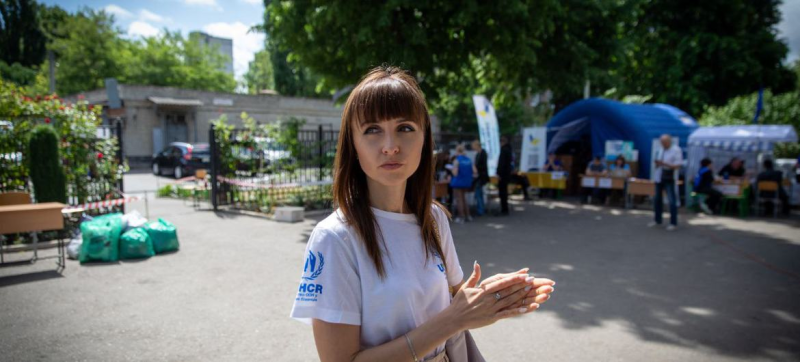- US Faces Pressure as UN Votes on Gaza Ceasefire |
- Prof Yunus includes 4 political leaders in UNGA tour del |
- Tarique calls for vigilance to prevent troubles during Puja |
- Parties divided on constitution order move over July Charter |
- Khulna’s ‘white gold’ shrimp eyes Tk 22,600cr export goal |
Humanitarians Risk Lives to Aid Ukraine’s Displaced

Viktoria Tiutiunnyk, a protection associate working in Ukraine for the UN Refugee Agency, UNHCR.
UN aid worker Viktoriia Tiutiunnyk embodies the resilience and compassion driving humanitarian efforts on the frontlines of Ukraine. Displaced from the Luhansk region following Russia’s full-scale invasion in 2022, she now helps others navigate the trauma of displacement.
“Sometimes it feels like we're swimming against a current that never slows down,” says Ms. Tiutiunnyk, a protection specialist working in Ukraine for the UN Refugee Agency (UNHCR). She herself was forced to flee Luhansk after the onset of hostilities.
“I was not part of the humanitarian community,” she recalls, speaking about the early days of the invasion, ahead of World Humanitarian Day.
“I was not with UNHCR at that time. I was a civil servant, but I think those events in my life, and in the life of the whole country, triggered me to switch to the humanitarian sector. That’s when I joined UNHCR.”
With evacuations ongoing in eastern Ukraine, Ms. Tiutiunnyk is now helping evacuees and newly displaced people in the Dnipro region, as well as those who remain in frontline areas.
Since 1 August last year, more than 192,000 people have left the region, either on their own or with support from authorities and volunteers – and UNHCR is providing them with much-needed assistance.
“When I meet people after an attack or at a shelter where they are staying, it reminds me why I do this work,” says Ms. Tiutiunnyk, who recently returned from a field mission. “When they open up, when they share their stories, what they've gone through, it moves me deeply. At that moment, I truly feel I’m where I’m meant to be.”
Many displaced people are under extreme stress; their lives are filled with fear and anxiety. Some fled in a hurry without passports or other essential documents, while others urgently need money for food and medicine.
UNHCR’s emergency response includes psychological support, legal aid, and cash assistance. “We also provide support to some collective sites where people can stay temporarily until they find other places,” explains Ms. Tiutiunnyk.
With the war now in its fourth year and 3.7 million people internally displaced, humanitarian needs continue to escalate. “The war goes on, the attacks continue, the needs keep growing,” she says.
Providing assistance on the frontlines often means working under dangerous conditions, including drone and aerial strikes. As she spoke to UN News, an air-raid siren blared in the background.
“It is stressful for sure. For many people, it’s now their daily life. They remain in frontline areas despite daily shelling and attacks. Why? Because this is their home.”
In their work, Ms. Tiutiunnyk and her colleagues speak daily with people who are deeply traumatised – many plead with humanitarian workers not to abandon them.
“I’m the same. I’m also displaced, and if I can bring them that hope, that small assistance, contribute even a little to stabilising their situation, it gives my life some meaning.
“Some people say they get used to the air-raid alerts and the situation in general. But you cannot get used to this, right? This is not normal. It shouldn’t be the new normal,” she adds.
When asked what keeps her going, Ms. Tiutiunnyk says she draws inspiration from her colleagues – people she often spends more time with than her family – and from her managers, who, as she puts it, “work around the clock.”
“When I see that they can continue, why can’t I continue? You need to think: are we pursuing a common goal? Yes, we are. So, we’re in the right place.”

